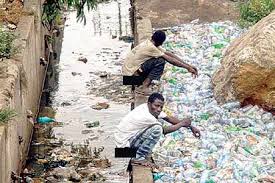As the rainy season begins in rural and suburban communities across Nigeria, an alarming pattern emerges: the neglect of basic hygiene practices. Residents, often unaware of the dire consequences, discard trash and human waste into floodwaters, fuelling a cycle of disease and environmental degradation.
Abosede Johnson, a resident of a suburban community in Abuja, describes the situation vividly: “When it rains, some neighbours throw trash into the water, while others step into it barefoot, pushing waste with their hands if the current doesn’t carry it away quickly enough.” Unfortunately, this is not an isolated incident; it reflects the reality in many neighbourhoods across the country.
The misguided belief that rainwater will wash away waste is not only incorrect but also hazardous. The trash and human waste do not simply disappear; instead, they settle in local areas, contaminating water sources and posing significant public health risks. The consequences are severe, with diseases like cholera and other waterborne illnesses spreading rapidly during the rainy season.
Nigeria has a troubling history with cholera outbreaks, with significant cases and fatalities reported in 2010, 2011, and 2018. As of August 2021, the Nigeria Centre for Disease Control reported over 37,000 suspected cases and 1,178 deaths across 23 states—numbers that exceed half of Nigeria’s COVID-19 deaths within just seven months. While medical interventions can manage outbreaks, they fail to address the root causes of cholera transmission: poor sanitation and lack of access to clean water.
The practice of improper refuse disposal and open defecation directly contaminates water used for drinking and personal hygiene, leading to the spread of waterborne diseases. Beyond the immediate health risks, these habits also pose significant environmental threats. Flooding, a frequent occurrence during the rainy season, is often exacerbated by clogged drainage systems. Many areas suffer from inadequate drainage, and those that do have drains often see them turned into dumpsites or open defecation grounds. This not only heightens the risk of flooding but also creates eyesores and foul odours that detract from the quality of life in these communities.
Indiscriminate refuse dumping threatens ecosystems, wildlife, and human health. Contaminated water harms aquatic life and makes it unfit for human consumption. Toxic substances from waste seep into the soil, negatively impacting plant growth and agricultural productivity. Flooding and erosion, too, are often consequences of clogged waterways, with persistent dumping. turning streets into makeshift landfills that attract disease-carrying pests and increase the risk of infections.
Open defecation has similarly severe and wide-ranging environmental consequences. Human waste disposed of in the open can seep into groundwater, rivers, and lakes, contaminating water supplies and leading to the spread of life-threatening diseases like cholera and diarrhoea. Additionally, the nutrients and pathogens in human waste can alter soil chemistry, reducing crop yields and threatening food security. The release of harmful gases such as methane and ammonia from exposed waste contributes to air pollution, climate change, and respiratory problems in humans. Moreover, open defecation degrades ecosystems by attracting pests, harming wildlife, and disrupting natural habitats, leading to a loss of biodiversity.
The social and economic impacts are equally concerning. Disease outbreaks linked to poor sanitation result in increased healthcare costs, lost productivity, and a decline in tourism, as areas plagued by open defecation become unpleasant and unhygienic.
Addressing these issues requires a multifaceted approach. Sensitisation and education are crucial in changing behaviour and reducing the health and environmental hazards associated with poor hygiene practices. The government must take an active role in educating residents about the dangers of indiscriminate waste disposal. When communities understand the consequences of their actions, they are more likely to adopt healthier practices.
In addition to education, proper waste management infrastructure and community engagement are essential. Community-led initiatives that promote behavioural change and encourage responsible waste disposal can play a significant role in curbing these harmful practices.
By tackling the issues of indiscriminate refuse dumping, open defecation, and other unhygienic practices, we can reduce the spread of waterborne diseases, mitigate environmental damage, and create healthier, more sustainable communities for future generations.
As the rainy season begins in Nigeria, a troubling pattern of poor hygiene practices, such as indiscriminate waste disposal and open defecation, contributes to environmental degradation and public health crises. Residents often mistakenly believe that rainwater will wash away trash and human waste, leading to serious consequences including contaminated water sources and the spread of diseases like cholera.
Cholera outbreaks in Nigeria have been severe, with significant cases reported over the years. The improper disposal of waste exacerbates flooding by clogging drainage systems, which are either inadequate or turned into dumpsites. This not only leads to environmental risks but also affects the quality of life and wildlife.
Open defecation has dire health and environmental impacts, such as contaminating water supplies, reducing crop yields, and contributing to air pollution. The economic costs are also high, with increased healthcare expenses and reduced productivity.
To address these issues, it is crucial to implement a multifaceted approach that includes public sensitisation and education on the dangers of poor hygiene practices, coupled with the development of proper waste management infrastructure and community-led initiatives. This can help mitigate the spread of diseases, protect the environment, and foster sustainable communities.






